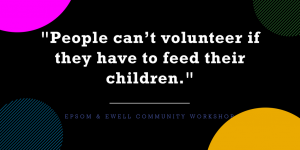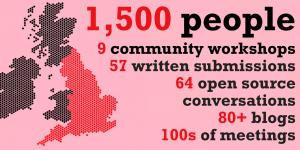From the industrial revolution to the internet: putting power in people’s hands

Civil society? We may not use this phrase every day, but it’s at the heart of our everyday lives – from churches to charities, social media to social enterprise, it’s so often where we find community, meaning and purpose.
But even though it’s the foundation stone of our country, civil society doesn’t and cannot stand still. It is shaped at times of change and also has its biggest impact at just those times.
I’ve been constantly reminded of the importance of civil society – and how we need to respond better to a changing world – through the many events and national debates in this first year of the Civil Society Futures inquiry. Terrorist attacks in London and Manchester, Brexit, Grenfell, #metoo, Oxfam and now Windrush.
Looking further back we can see the historic arc and civil society’s response. From the Industrial Revolution and the transformation of our cities, to the post war settlement and the identity and protest movements of the 60s and 70s, there is a golden thread: civil society responding, reshaping, reinventing and making a difference.
Born from resistance, reminding us always of the importance of people, ensuring that powerful forces do not overwhelm those without power, and doing so most creatively when the world is changing.
And we are now in just one of those times. 
This is a time of huge possibility. A time when technological advances can help us to communicate and collectively develop solutions in ways that our grandparents in civil society could never have imagined. A time of change which we can shape, because of the deep connections we foster, and our ability to make connections between people and between those who have power and those who are so often locked out of the big conversations and decisions.
Someone at a Voluntary Organisations Disability Group discussion — just one of more than 1,500 people who have contributed to Civil Society Futures this year — put it so well: “It’s a time for real opportunity… everything’s up in the air, actually anything can happen.”
Not all change is the change you want, of course.
The world of work is transforming, with more and more people finding themselves both insecure and disconnected. Our systems of political governance in England are changing with the creation of new regional bodies, metro mayors and the rest, but not deeply enough to address the degree of people’s discontent. Inequality of both income and wealth, but also inequality between generations, between places, between ethnic groups, shows no signs of disappearing.
Trust in institutions, including charities, is faltering. Communication is becoming both so much easier and so much more complicated. Movements, networks and platforms are challenging established organisations. And the rapid advent of artificial intelligence is bringing huge possibility and inevitable risk.
We stand at a pivot point now. We face the real risk of an ‘us and them’ future which shuts out so many – and the real possibility of opening up enormous change for the better.
This really is our time. It is time for civil society to do what it does best and respond to the changing world – to shape that world.
Doing so will not be easy. If it were easy we’d have done it long ago.
But listening to people all over the country in the first year of this inquiry, there is an enormous hunger for change. People are hugely active in civil society, there is no shortage of energy, commitment, ideas and imagination. But many are angry, they feel ignored and disconnected from those they see as having power – not just government and companies but large civil society organisations too.
And this is mirrored by funders and major organisations who tell us they need to understand more of what is happening, to be better connected to the emerging movements and networks that are so influential and need support, but they find so challenging. They know that without the active leadership of people and communities, their efforts will always be partial and limited in impact.
We’ve heard a lot about power, and of course we know that civil society is always in the end about power. But we’ve heard some uncomfortable truths about where power sits, and how it’s used. Established organisations can be creaky and slow to change, hoarding power at the top when people want them to be more contemporary, responsive, engaged, and where appropriate more fluid. We’ve heard that people want to feel a sense of identity and belonging, and look to civil society to provide that. Too often they feel that membership schemes are inadequate and only transactional.
Time and time again we have been told that people are proud of where they live, they are proud of the communities in which they are involved, and they want to contribute more, but they feel silenced and ignored. And they need spaces and ways to come together and talk, plan, disagree. Spaces which can be genuinely held in common where the difficult, complicated conversations can take place and hugely difficult and complicated decisions get made. Ways to belong that transcend divisions such as geography, race or religion.
Everywhere people want power in their hands – to use it collectively, for good. To answer the most difficult questions of our times – such as how people can thrive in an internet age of work – and to do it in a human way. So much is possible if we can unleash this collective will.
Some of this might sound utopian, but we have also heard that these changes are not optional.
The future of our society depends upon a revived, re-energised, connecting civil society that puts people in the lead, asserts the value and contribution of every human being, and enables people to bridge with confidence and imagination the very many divides that today trouble so many.
This change won’t happen out there – each of us has a responsibility to shape the future as we want it to be. Through the course of the rest of the year we will doing more to involve many: young people, local communities, big institutions and many others across England. I hope you will be one of them.
Read the Civil Society Futures work in progress report >>>
The Calouste Gulbenkian Foundation (UK Branch) is a co-funder of Civil Society Futures, along with seven other organisations.

